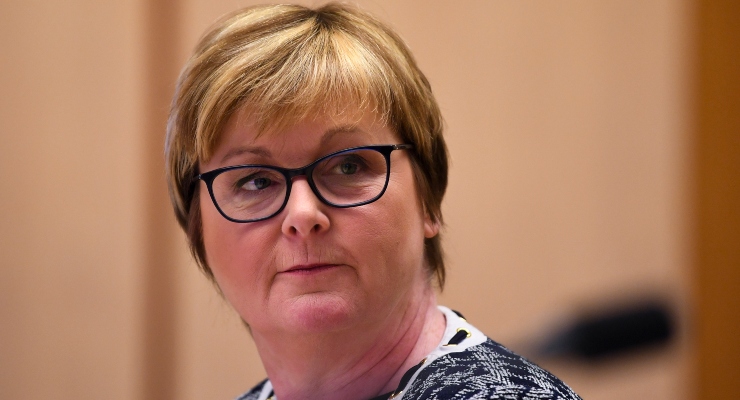
National campaign for Hamilton Leigh Sales started the morning off on a strong note, asking in a tweet why there is no national campaign to get vaccinated: “I’ve literally seen more marketing for @HamiltonMusical than I have for public health.”
Funny. Except she’s wrong. The Health Department launched a national coronavirus campaign back in March 2020, and on January 27, 2021, launched a $23.9 million public information campaign to encourage Australians to get a COVID-19 vaccine.
Of course, just because something is there doesn’t mean it’s working.
The campaign was supposedly rolled out in three phases: the first reaffirms that COVID vaccines have been put through our world-leading independent approvals process, ensuring both their safety and efficacy; the second provides information on how the vaccine will be rolled out, particularly to priority groups, and dosage requirements; the third informs people about how and where to get vaccinated, dosage requirements, and support vaccine uptake.
Which phase are we up to again?
Perhaps if Hamilton’s marketing team is as successful as Sales says, the government should have partnered with it for some vaccine product placement to really get the word out.
Humane bureaucrats NDIS Minister Linda Reynolds knows a lot about empathy, as we know. She failed to provide anything approaching decent support when one of her staffers allegedly raped another staffer, Brittany Higgins, in Reynolds’ office, even summoning Higgins to a meeting in the very office where she says she was assaulted. Later she referred to Higgins as a “lying cow”.
She’s a true master of empathy.
We were thus fascinated to see her judgment about public servants dealing with people with disabilities. It turns out Reynolds thinks bureaucrats have too much empathy. “We’re relying, I think, too much on individual public servants’ judgment and also their natural empathy,” she told a Senate committee yesterday.
In Reynolds’ view you need external contractors to properly assess the needs of people with disabilities, not weak-willed, namby-pamby shiny arses prone to indulging people.
Another rationale for further contracting out basic functions of the public service — though we admit a novel one. Bureaucrats are more traditionally seen as cold and heartless when it comes to access to services and government support. Who knew?
The placebo effect on facts and fairness Just as new polling published by Nine papers shows that Australians are increasingly unwilling to get our safe, proven and effective COVID vaccines, a review of another media company’s actions might provide some insight into why people are feeling this way.
Late last week, the Press Council found that News Corp’s Herald Sun had misled and failed to present facts with fairness and balance with its December headline about Pfizer’s vaccination trials: “SIX PEOPLE DIED DURING PFIZER”. It was followed by a Facebook post along the same lines.
While technically true, the issue with the headline was that four of the six people who died during the trials got the placebo and not the vaccine. The adjudication wryly notes that this means Pfizer’s vaccine “was unlikely to be the cause of their death”. It took six months for the Press Council to come to this decision and there are no consequences for the company.
The News Corp cycle On May 10 News Corp Australia confirmed it had formalised payments from tech giants Google and Facebook and announced a digital-focused hiring spree. But in nature’s cycle of life and death, just four days later Guardian Australia reported that a number of News Corp’s (already dwindling) staff photographers across several mastheads were called in to meetings with management and told their positions were being made redundant.
It’s not all bad news though. According to the Guardian’s Amanda Meade, they can buy their photography equipment at discounted prices and come back to work as outsourced labour.








Surely if some public servants exhibit too much empathy we can give them more training to eliminate it?
The whole notion of training and upskilling public servants went out the window years ago. Much more profitable for the consultants if public servants are given just the basic stuff to do.
Yes, Laming and others would be great teachers!
Can’t the “Robodebt” computers be reprogramed?
From what I can tell, a lot of money goes into giving managers “empathy” training. The training, as far as I can tell, doesn’t teach empathy but how to mimic it. This way the career-hopping sociopaths that a bureaucracy rewards with executive roles can fake being human for those under them.
Today I drove an hour to my local town in WA to get vaccinated. I found the place, despite no sign outside, and was told there’d be no vaccine without an appointment, and no appointment without a “Link”. I’m 73 with a few health issues so I asked about Pfizer and was told no Pfizer without a doctor’s letter. So, I need a link, a letter and an appointment.
Now, I’ve been vaccinated against more diseases than I can remember, but it has never involved 3 trips to town. There’s never been 2 people sitting there, full time, turning people away. If I didn’t know better I’d say that the system is set up to fail. It is, after all, a slightly painful procedure so I’d have thought that fewer barriers and a bit more encouragement would be in order.
Like, just give me the jab.
Interesting that Melbourne has large open access vaccination centres via the state govt. but not promoted by the Federal govt., why? Viewed politically as a threat and/or competition?
I cant believe how dumb we are becoming. No wonder we have an LNP government.
I’ll put it simply, Dont vote LNP.
I was employed as a Commonwealth Medical Officer by the Department of Health from 1989 until 2006. One of our duties as CMOs was to work in Centrelink offices assessing applicants for Disability Support Pension. This function was taken away from CMOs in 2006; part of the then Government’s reasons for dispensing with CMO assessments was that we were allegedly captured by the “Stockholm Syndrome” and were too sympathetic to DSP applicants. We were seen as “too empathetic”…
I was talking to my doctor friend -apparently the system for Disability pensions used to be that the local GP made the original assessment and sent to blokes like you for review- at the end a fair decision was made as not too many rorters actually got through.Then Labor took it away from that independent team system and you guys were left in a vacuum and it appeared statistically that you were too empathetic – then cheaper nurses with no degree of knowledge of disabilities but a good steady public service job became advisers – now people with no medical knowledge make the assessment based on tick the box on the computer screen.
Bit like MyAged Care and NDIS – those who fill in forms best prosper most. I am practicing filling out forms for to maximise benefits available.
Desmond; yes I understand that is what happened (I retired as a CMO in 2011). Part of the justification for removing CMOs was that we (CMOs) were “too expensive” and that nurses were then substituted, then, in turn they were supplanted by paramedicals, so you ended up with psychiatric problems being assessed by physiotherapists (25% of all DSP of DSP applicants were psychiatric in my day) and and musculo-skeletal issues being assessed by psychologists. The CMO always had the “treating doctor’s report” (SA12 I think from memory), preferably augmented with treating specialists’ reports if available. In the end (2006) a computer screen was introduced (as you say) with absolutely NO capacity for assessing the very human issues which doctors have bred into their traing (the “art” as well as the “science” of all good medical training and pratice) was made available, and I think, deliberately expunged.
Why would Australian media outlets message or promote scepticism of vaccinations? Because it’s in the same eco-system as climate science denial and encouraging people to trust their instincts, feelings, beliefs and politicians, not science.
The anti-vaxxer movement seemed to grow legs generations ago in the US concurrently with the fossil fuel sectors discovered global warming due to carbon emissions….. then started a game of smoke and mirrors….